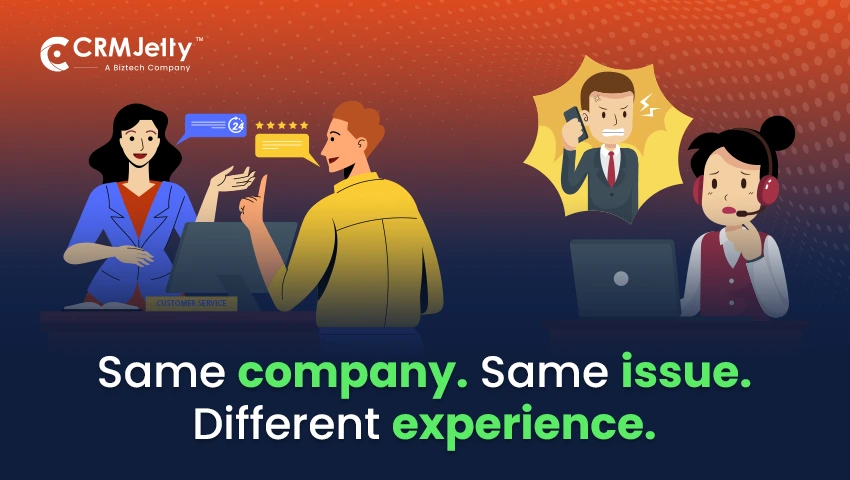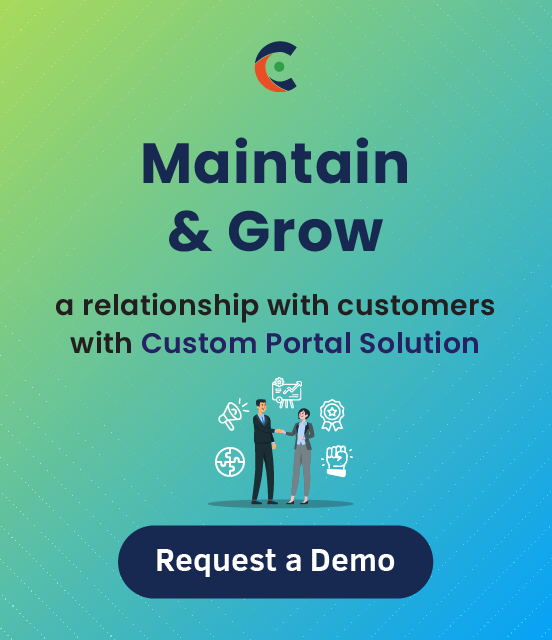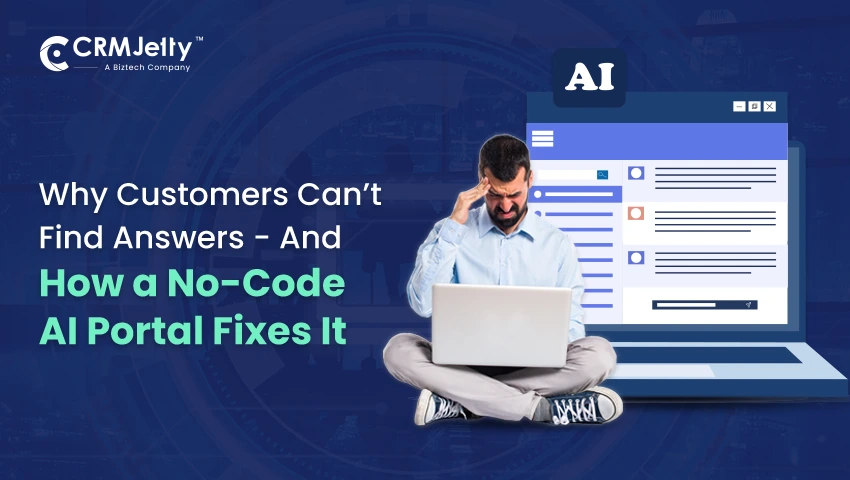Why Inconsistent Support Is Costing You Your Customers
73% of customers will switch to a competitor after multiple bad support experiences. And more than one half of your customers would switch for a competitor after just one poor interaction.
Here’s what that looks like in real life!
Two customers face the same issue. One gets a helpful, detailed response within the hour. The other waits half a day and receives a one-liner that barely makes sense. Same company. Same ticket type. Wildly different experience.
This isn’t a tech failure but a process failure.. One that happens when support depends too heavily on who picks up the ticket. Some agents write great notes. Others forget. Some follow up. Others vanish. The result? A support experience that feels unpredictable and impossible to scale.
You might not see it in your dashboards. But your customers feel it and they’re quietly walking away because of it.
We’ll dig into where this inconsistency comes from, how it affects your support metrics, and why the traditional tools you rely on might be making it worse.
The Real Problem: Inconsistency and Its Ripple Effect
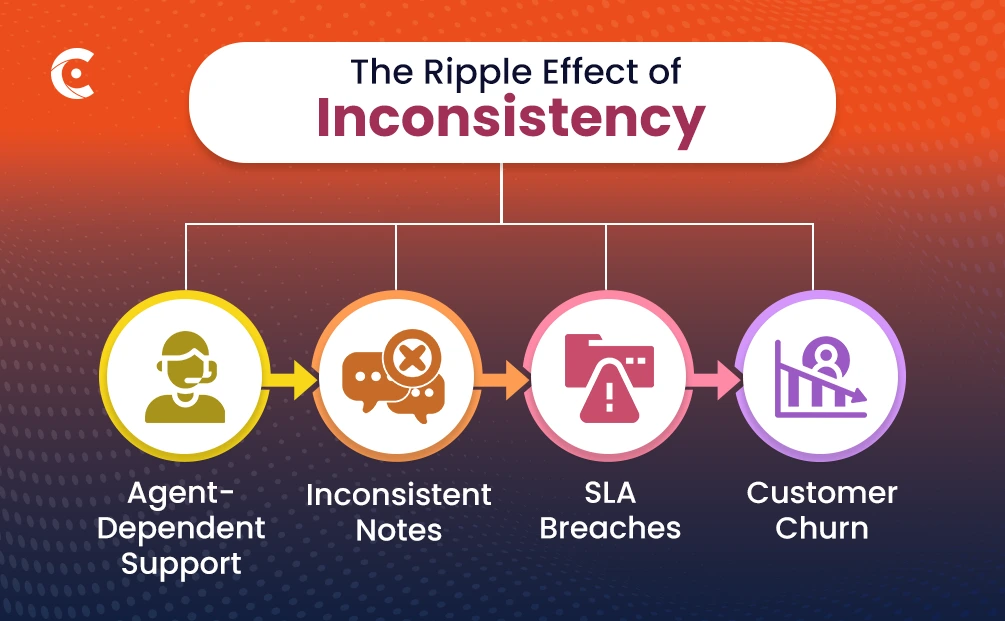
“It really depends on which agent gets the ticket.”
Support managers and customers say this often. It points to a major issue many teams face but rarely address: inconsistent support.
This problem doesn’t come from bad intentions. It comes from the way agents work. One agent may write a clear, detailed update with next steps. Another might leave a vague note or forget to log anything at all. These differences are not just about writing style. They’re operational risks.
Where the Problem Starts
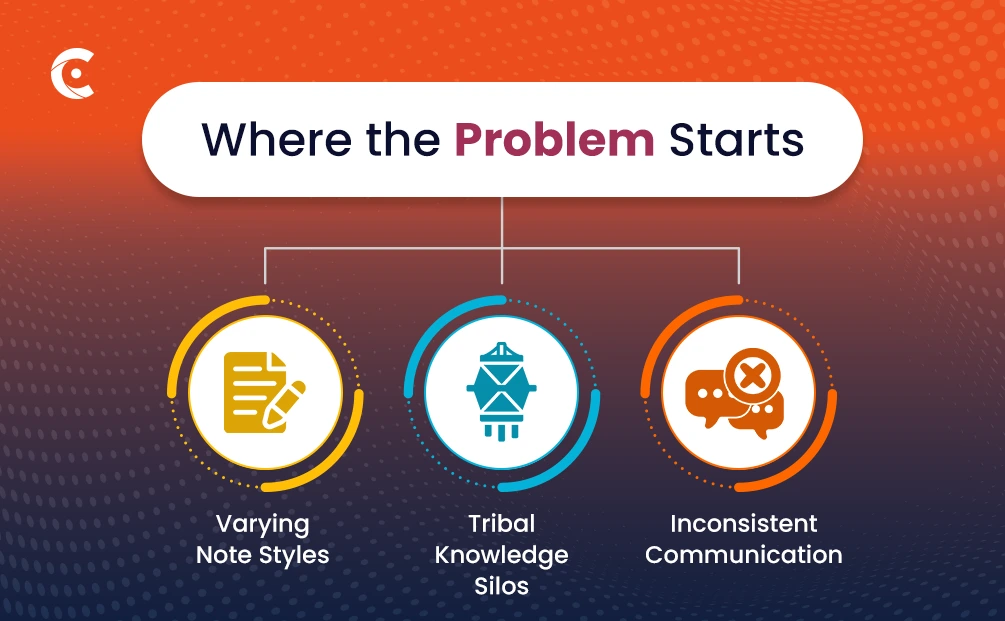
- Varying Documentation Styles: Every agent has their own way of writing case notes. Some are detailed. Others use shortcuts or leave out key information. The result is a mix of styles that causes confusion during escalations and team handoffs.
- Tribal Knowledge Silos: Agents working for years often carry critical knowledge in their heads. When they leave, that expertise goes with them because it was never properly documented.
- Inconsistent Communication: The tone, completeness, and clarity of responses fluctuates depending on who’s replying. This impacts customer trust and makes support feel unpredictable.
How It Affects the Business
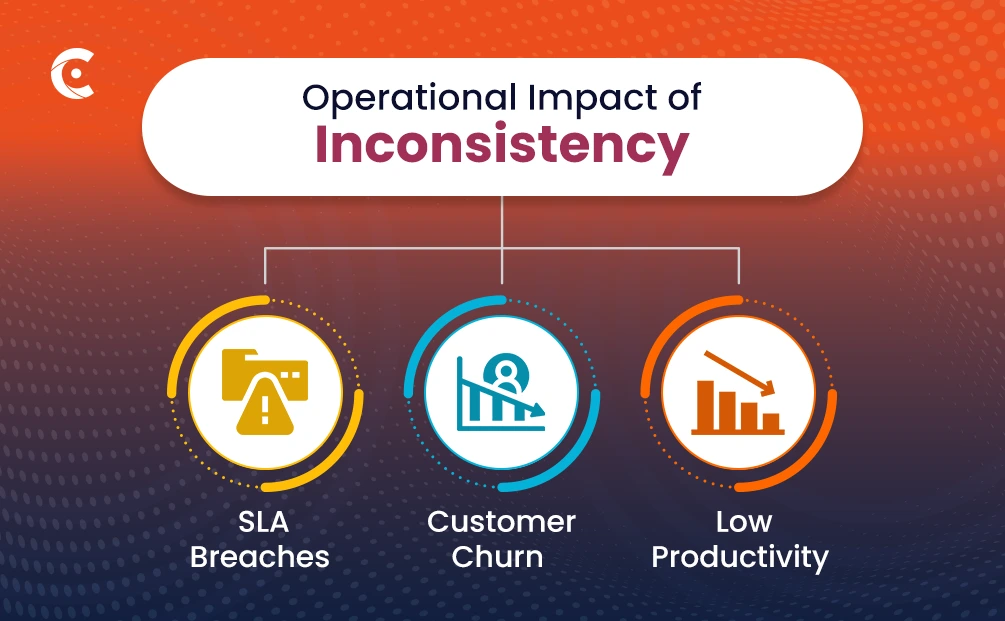
- SLA Breaches: Incomplete or unclear case records mean more back-and-forth, slower resolutions, and missed service-level targets.
- Customer Dissatisfaction: Customers notice that other customers get better or faster support. This inconsistency leads to frustration, negative reviews, and churn.
- Poor Internal Collaboration: Without clear, consistent notes, agents waste time deciphering past interactions or repeating efforts. Basically, it’s a productivity killer.
Support teams aim to provide a seamless experience. But without automation or standard tools in place, they can’t. Every ticket depends on who picks it up. That means the quality of support keeps shifting.
This leads to lower CSAT, slower response times, high turnover, and support operations that just can’t grow with the business.
Up next, let’s look at why traditional tools, even those built into your CRM, don’t solve this issue.
Why Traditional Tools Fall Short
Most support teams rely heavily on the capabilities provided by their CRM or helpdesk platform. The tools are often the same, whether it’s Salesforce, Microsoft Dynamics, or another ecosystem. You get manual ticket fields, note-taking areas, and basic search across a knowledge base. But when it comes to maintaining consistency in communication and documentation, these tools fall short, and the consequences compound over time.
The Manual Burden
Traditional systems depend on agents to manually write internal notes. They summarize conversations, and tag tickets with relevant information. On the surface, this seems manageable. But when teams handle hundreds or thousands of tickets per month, even a small inefficiency becomes a major resource drain.
Worse, manual processes are:
- Prone to inconsistency: Each agent writes differently. One might write clear summaries. Another might just type a sentence or two.
- Error-prone: Key context can be skipped, miswritten, or lost. That leads to confusion later on.
- Redundant: Agents often repeat the same responses. These boilerplate replies take time and add no real value.
Fragmented Systems, Fragmented Experience
Agents often work across multiple tools. Be it CRM, knowledge base, internal documentation platforms, and sometimes even email or chat logs. Without intelligent integration, agents are forced to copy-paste details or jump between tabs just to write one update. This slows everything down. It adds stress and creates room for mistakes.
Limited Search Capabilities
Search is another weak spot. Many systems rely on keyword-based logic. This means users and agents must know the exact terminology used in documentation to find relevant answers. If a customer phrases a problem differently, they’re likely to hit a dead end, which results in more tickets, longer queues, and rising frustration.
Old support platforms were designed around manual inputs, not automation. They weren’t built to handle the complexity and personalization expected today. And that’s exactly where CRMJetty’s Best AI portal for customer service teams changes the game.
Enter CRMJetty’s AI-Powered Case Interaction Suite
To eliminate inconsistency and agent dependency in customer support, CRMJetty introduces a game-changing solution, the AI-Powered Case Interaction Suite. Built with OpenAI’s advanced language models and designed specifically for support portals, this suite eliminates manual effort and replaces it with intelligent, automated assistance.
How It Works
Rather than relying on each agent’s memory, style, or availability, CRMJetty’s AI system taps into the case history, context, and customer inputs to generate:
- Automated case notes solution summarize key conversations.
- Context-aware case comments that guide the next steps.
- Natural language responses to customer questions using knowledge base content.
- Relevant article suggestions right within the portal or agent view, before a ticket is even created.
All of this happens in real-time, without the agent needing to write a single word manually.
Key Features
- AI-Powered Case Deflection: Customers get instant, intelligent answers from the portal itself — no ticket needed.
- Auto-generated Notes & Comments: Agents get pre-written summaries they can edit, review, or use as-is.
- Context-Aware Knowledge Suggestions: The AI surfaces the most relevant content based on real-time case context.
- CRM-Agnostic Integration: Whether you use Salesforce, Dynamics, or another CRM — the suite works without lock-in.
- Portal-First Architecture: Designed to live where your customers already go for help.
Why It’s a Game-Changer
This isn’t just another support bot or chatbot plugin. CRMJetty’s solution:
- Standardizes documentation across your team.
- Reduces dependency on individual agents’ knowledge or writing style.
- Saves 5–10 minutes per ticket in writing and documentation effort.
- Enables consistent, high-quality support even during agent transitions or turnover.
The Result?
Faster case resolution, reduced agent fatigue, improved CSAT, and a self-service experience your customers actually trust. It’s not just smarter support, it’s scalable, sustainable support.
Key Benefits of CRMJetty’s AI Automation
CRMJetty’s AI-Powered Case Interaction Suite isn’t just about automation; it’s about better support at scale. By embedding a CRM portal with AI automation, your organization experiences a ripple effect of efficiency, consistency, and customer satisfaction.
1. Consistent, Standardized Documentation
AI ensures that every case note and comment follows a consistent structure and tone, no matter which agent is assigned. This eliminates ambiguity, miscommunication, and the dreaded “What did the last agent do?” confusion.
✅ Result: Clear, professional notes every time, improving team collaboration and handovers.
2. Reduced Agent Workload
Manually writing notes, summarizing conversations, and tagging issues can take 5–10 minutes per case. AI handles this instantly.
✅ Result: Agents can focus on solving problems, not documenting them.
3. Faster Resolution Times
Customers get instant answers via AI case deflection tool before they ever submit a ticket. And if they do need human support, agents have full context at their fingertips.
✅ Result: Reduced wait times and quicker solutions.
4. Improved Onboarding and Training
New agents no longer start from scratch or rely on “tribal knowledge.” AI-generated, well-structured case histories serve as reliable learning materials.
✅ Result: Faster ramp-up times and fewer errors from junior team members.
5. More Personalized, Helpful Interactions
AI responds using natural language and understands context, making interactions feel tailored and intelligent.
✅ Result: Customers feel heard and helped, not routed through canned replies.
6. Significant Cost Savings
Preventing 30–40% of tickets with deflection and saving minutes per ticket on documentation leads to substantial monthly savings in labor hours.
✅ Example: For a team handling 1000 tickets/month, AI saves up to 160 hours, equivalent to 2–4 full-time agents.
Real-World Impact: The Numbers That Matter
AI sounds promising but what does it really change for your support team? When done right, the difference shows up in your metrics. CRMJetty’s AI-Powered Support Portal is not just another software add-on. It brings real, measurable improvements that cut costs, save time, and boost customer satisfaction.
Time Saved on Every Case
On average, agents spend 5–10 minutes per ticket writing internal notes, case comments, and tagging issues. With CRMJetty’s AI handling that automatically:
- 1,000 tickets/month × 10 minutes = 10,000 minutes saved
- That’s over 166 hours per month, or the workload of 2–4 full-time agents
✅ Result: You can handle more volume without increasing team size.
Ticket Deflection: Reduce Support Load at the Source
Using AI to understand natural language and suggest knowledge base articles at the right moment:
- 30–40% of incoming tickets can be deflected
- Preventing 300–400 tickets per 1,000 monthly requests
- If each ticket costs $5–$15 in labor, that’s $1,500–$6,000 in monthly savings
✅ Result: Lower operational cost and happier users who get answers instantly.
Improved SLA Compliance and First Response Time
Inconsistent documentation leads to longer handovers and resolution delays. CRMJetty’s AI ensures:
- Standardized notes and tagging = faster context switching
- Agents resolve issues faster, improving SLA adherence
✅ Result: Reduced breach risk and higher trust in your support operation.
CSAT and Retention Improvements
Customers notice when support feels inconsistent or slow. With CRMJetty:
- Personalized answers and quicker resolutions improve CSAT scores
- Consistency builds long-term loyalty and retention
✅ Result: Every customer touchpoint reinforces trust in your brand
Why CRMJetty’s AI Approach Is Different (And Better)
Many AI support tools in the market feel like afterthoughts. They work only if you’re locked into a specific platform, and even then, they mostly offer basic automation like keyword matching or chatbot replies. CRMJetty takes a smarter path.
Our AI-powered support portal is built with flexibility in mind. It’s designed to integrate with your current systems whether that’s Salesforce, Microsoft Dynamics, or another CRM, so you don’t have to change what’s already working.
Not Just Another Add-On
Most AI tools in the market like Salesforce Einstein, Zendesk AI, or Freshdesk Freddy are tightly coupled to their ecosystems. If you don’t use their platform, you don’t get their AI. Even if you do, the support AI is often focused on chatbot automation or basic keyword search.
CRMJetty flips this approach with a portal-first, CRM-agnostic AI suite that’s built to plug into your environment—Salesforce, Microsoft Dynamics, or any other CRM.
What Makes CRMJetty Different:
CRM-Agnostic and Flexible
- Works across multiple CRM platforms
- No need to overhaul your tech stack
- Ideal for multi-platform enterprises or growing teams
Portal-First Architecture
- AI is embedded directly into your customer portal
- Enhances the self-service journey, not just backend workflows
- Promotes portal adoption by making it smarter and more intuitive
Natural Language Understanding (NLU)
- Understands how real users phrase questions, not just keywords
- Surfaces the most relevant knowledge or generates a smart, contextual response
No-Code Customization
- Configure workflows, suggestions, and tagging logic without developers
- Adapt quickly to process changes or new use cases
Designed to Scale Without Complexity
Whether you support 500 or 50,000 customers, CRMJetty’s AI helps you scale operations without adding headcount or increasing overhead. The result is a smarter, leaner support process that evolves with your business. CRMJetty isn’t just another AI bolt-on. It’s a purpose-built, AI-enhanced support engine that works where you need it—and grows as you grow.
What You Can Do Next
If you’ve identified inconsistency, delays, or unclear documentation in your support process, now is the time to act. Start by auditing your current system. Try to find answers to questions like how to automate case notes in customer support, how often tickets are escalated due to unclear handovers, and whether your support quality changes depending on the agent.
Once you have that baseline, evaluate where automation can reduce the load. Ask:
- Can agents spend less time on repetitive updates?
- Are customers finding answers on their own, or opening tickets unnecessarily?
- Is your team aligned on how to communicate and document each case?
From there, map out the kind of support experience you want to offer one that’s consistent, fast, and scalable. Then look for tools that don’t just plug a gap but fit your long-term support vision.
CRMJetty’s AI-powered support portal is built for that future. It’s not just another case management tool. It’s a consistent customer support software designed to evolve with your team and your CRM.
Try CRMJetty’s AI-Powered Case Interaction Suite and see what smart, scalable support really looks like.
All product and company names are trademarks™, registered® or copyright© trademarks of their respective holders. Use of them does not imply any affiliation with or endorsement by them.


